Chris Morris on his legacy and investing via his family foundation with daughters on legacy projects
Computershare billionaire Chris Morris almost sold his cherished Mornington Peninsula estate a few times when he ‘needed money’ but his daughters always stopped him. It’s the one thing he now can’t live without.
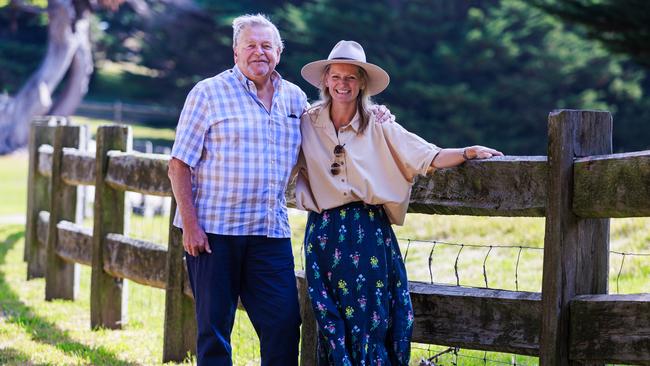
Barragunda, a 405ha estate on the southernmost tip of Victoria’s Mornington Peninsula, will always have a special place in the hearts of billionaire Computershare founder Chris Morris.
The ashes of his first wife, Maree Morris, are scattered under a gum tree he and his three daughters planted next to the historic homestead on the property.
Maree died on August 18, 2014, 10 weeks before her 60th birthday, after a battle with blood cancer.
The tragic loss led the Morris family to become one of the first donors to the Snowdome Foundation charity which undertakes blood cancer research.
“My first wife and Mum’s ashes are scattered at Barragunda, as are Nana’s,” Morris says softly.
“So it is a special place. I’ve tried to sell it a few times when we have needed money for other things. But my daughters Hayley, Nikki and Katie got very upset.
“About the only thing in the world I can’t sell is Barragunda. It is the one thing in our lives that is always constant.”
It was his mother who set Morris up for success in life. After her son had failed most subjects at school, she enrolled him in Australia’s first computer course in 1966 to pursue his love of computer programming.
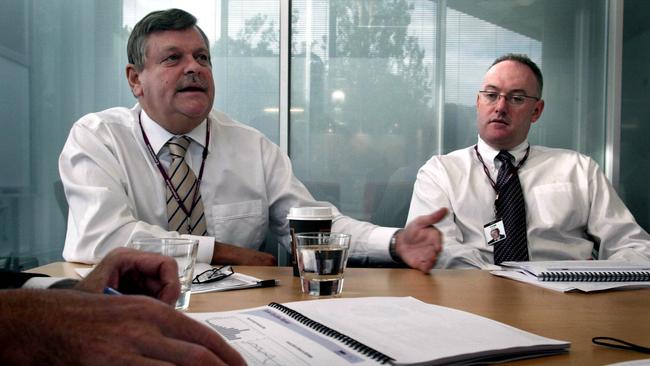
He went on to start Computershare in 1978 and today the company has a market capitalisation of over $22bn. It has more than 18,000 employees in 28 countries providing financial services for companies to manage their shareholder engagements.
While the Morris family still has a substantial shareholding in the company, their Morris Group of businesses now span hospitality, tourism, technology and aviation.
Its assets include pubs such as the Portsea Hotel, South Melbourne’s O’Connell’s Hotel and Brighton’s Half Moon, as well as craft breweries.
There is also a charter fleet of helicopters and superyachts, luxury lodges and private islands on the Great Barrier Reef, including the $20,000-per-night Pelorus private island.
His middle daughter, Hayley, has worked alongside her father since her teens – first at Computershare before she joined the Morris Group where she now serves as director.
Fifteen years ago her father backed the creation of the Morris Family Foundation, the philanthropic arm of the Morris Group that makes impact investments in food security, sustainable agriculture, and protection and restoration of the environment.
Impact, or so called shared-value investing, provides investors with financial as well as social returns.
Building foundation for the future
For the Morris Family Foundation, these include research and restoration work on the Great Barrier Reef, lobbying big companies to switch to green energy and electric vehicles, transitioning agriculture to regenerative farming practices, Indigenous training and employment programs, and rescuing child victims of human trafficking and slavery.
Now for the first time, the foundation has a direct relationship with Barragunda as the major shareholder in a new paddock-to-plate restaurant venture – Barragunda Dining – the Morris family has opened adjacent to the abundant market garden on the property.
“We considered other names, but the name is inspired by the history of the land. When we have been at Barragunda over the years, you could always hear the roar of the ocean in the distance, even on quiet days. It felt like it was always present,” Hayley says.
Barragunda Dining’s executive chef is Simone Watts, previously head chef at the former Morris Group property, Daintree Ecolodge.
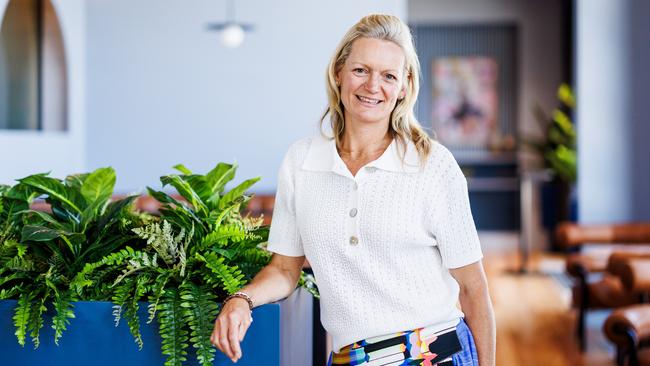
Over lunch with her father and I at Barragunda, Hayley says the venture sits separate to the other hospitality businesses within the Morris Group portfolio.
“For me, it is a true impact investment. We are doing something meaningful and the impact is just as important as any financial gain,” she says.
“The restaurant can be a showpiece that works here because we don’t have to transport our produce, we grow it all ourselves. That is the challenge in the city, with transport costs adding up. So here we can keep prices lower for customers.
“The restaurant concept is aligned with the foundation’s values, and it has been amazing seeing the whole Morris Group staff get involved, from marketing and finance to the general hospitality team.”
All the profits from the restaurant are directed back to the family foundation to support grassroots projects driving change in Australia’s food systems to advance the shift to regenerative practices.
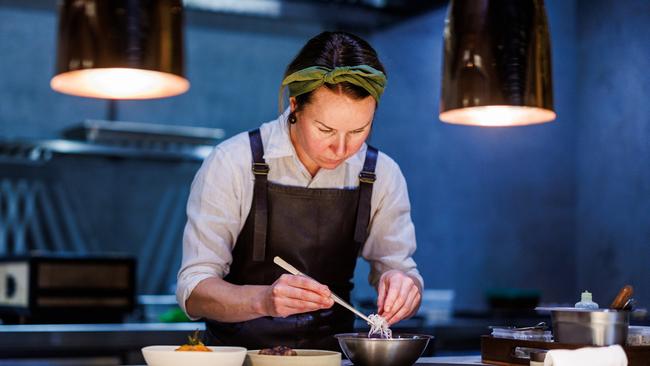
Regeneration close to the heart
The Morris family has practised regenerative agriculture at Barragunda Estate since purchasing its first tranche of land there in 1999.
It has since bought the adjoining properties to now be one of the largest private landholders on the Mornington Peninsula.
“Regenerative farming builds up soil health, which in turn creates healthier crops and reduces the need for external inputs. We have diverse crops and rotate them, ensuring the land is always nurtured,” Hayley says.
“For example, we plant hedgerows of native vegetation to create windbreaks, attracting beneficial insects and reducing the need for pest control.
“It’s a holistic approach to farming that works with nature rather than trying to control it. It’s all about working with the land in a way that sustains it for the long term.”
Her father says he knew there was something special about the Barragunda property the first day he laid eyes on it.
“I got an opportunity to buy the house on the cliff in 1999. I drove up the driveway, looked at it for half an hour and paid a $500 deposit. I didn’t even show the kids. I told the agent ‘sign it up now’. I just knew,” he says.
The purchase took him back to his roots. He worked on his family’s orchard from the age of 10 and his first business venture was growing tomatoes when he was 17.
“We’d go to the Victoria Market to sell them, and there was a famous time when the market was blocked off by criminal gangs! We had a potato farm in Gippsland as well,” he says.
As a testament to this history, hanging on a wall of the homestead at Barragunda are old hessian potato sacks branded with the Morris name.
Chris and his second wife, Sharron Sills, reside now mostly live on Queensland’s Gold Coast, having relocated from Melbourne during the Covid-19 pandemic. They also have a home at Cannes on the French Riviera.
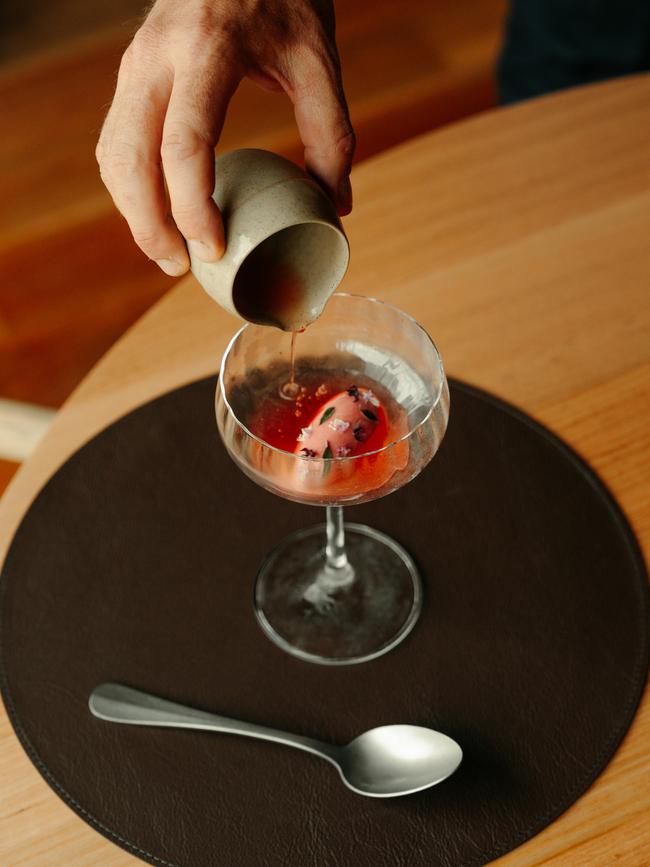
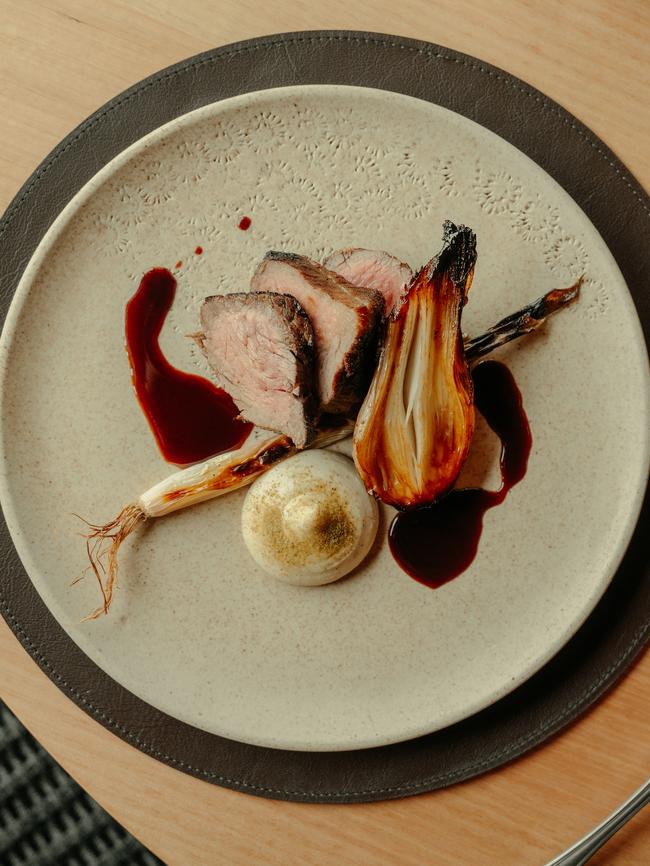
While his focus today is on his collection of pubs, hotels and craft-beer assets around Australia as well as Morris Group’s tourism holdings in north Queensland, he has still kept an eye on the evolution of Barragunda Dining.
“I think, in the end, we are not in it for money and profit is not the motive, but we also don’t want to lose money here,” he says.
“Hayley has done a few things where she has lost a few dollars. But you have to have a failure in life, especially in business.”
“They are all learning opportunities!” she responds with a wry smile, before adding that she welcomes her father drawing lines in the sand on what he will support in the family business.
“It is an interesting role as a parent in a situation like this. If he goes in and just supports everything I do, that is not healthy because then I don’t have boundaries,” she says.
“It’s the same thing with bringing up kids. So you have to be challenged.
“As much as some days you wish you didn’t have that challenge, in hindsight on some things you sit back and say ‘Oh, thank God there’s challenge there’, because it does create a boundary.
“If I’ve got to convince my dad and I can’t convince him, how am I going to convince others?”
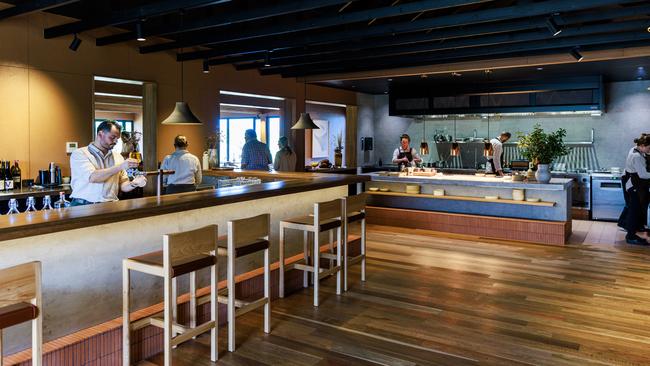
She says Barragunda Dining has been no different to other businesses in the Morris Group portfolio when it has come to convincing her father of its merits.
“There has always been a healthy amount from dad of like, ‘I’m there, but you’ve got to prove it. So let’s look at the projections; how is this going’?” she says.
“That also drives the behaviour of everyone around us. It’s not just ‘lets throw any bit of money at it.’ That doesn’t work. Because people have still got dad’s voice in the background and he’s not the sort of person to just throw money away.”
Her father has always admired his daughter’s independent thinking.
“She will argue with me because she is very much like me. The other two girls are beautiful and they are very happy that Hayley has been the one at the helm. She will be the one that will (eventually) take over oversight of the business. She won’t be running it, she will have other people running it,” Chris says, before looking at his daughter firmly in the eye and adding with a cheeky smile: “You wont’ sell them off will you? There are things in our business portfolio that Hayley isn’t that keen on, like casinos!”
Morris Group has spent $45m on the The Ville Resort-Casino in Townsville, transforming the hotel and casino into a luxury resort.
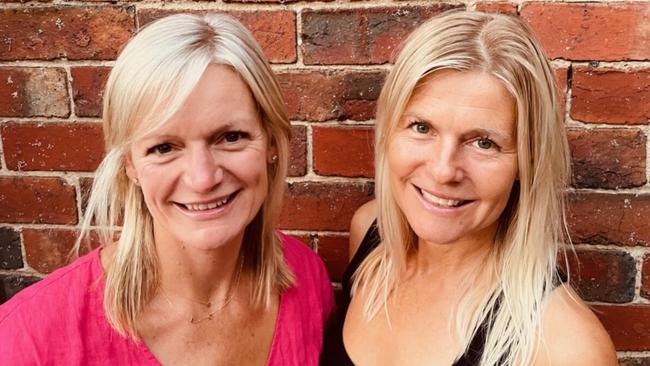
While Hayley’s sisters Nikki and Katie are involved in running of the Morris Family Foundation, Nikki – who is 20 months older than Hayley – does have some involvement in the Morris Group, whose CEO is former PwC executive Penny Cottle.
For example Nikki and Hayley have a monthly call with their father and Penny about the business.
“Nikki is part of the family board and comes to the strategy conferences, so we all stay informed,” Hayley says.
“Autonomy and decentralisation are key. Penny’s role is not to micromanage; we trust the CEOs to run their individual operations. So the question for the family is what can we do to support, compared to telling everybody what to do.”
Fond memories but no regrets
In September 2021 Chris stepped down from the Computershare board and says he doesn’t miss anything about life being involved with a listed public company.
“People overrate listed companies. Yes they are different to other companies and there are a few extra things you have to do. But I reckon we have more governance in a family company that we do in a public company,” he says.
“When we do things we are very conscious of the family and you don’t have that pressure to be making money all the time.”
He reveals that all of his daughters have been involved in the structuring of his will and succession planning because “we thought that was the right thing to do.” He turned 77 on April 14.
“The succession has been really worked out carefully. I want the business to keep going. I want that for all the people who work for me,” he says.
“I still know a lot of the Computershare people, they have been so faithful to me. Hayley also has a responsibility there and I think she respects that. Plus Penny (Cottle) is best friends with the girls and is a very smart lady.”
Hayley says that while she and her father have healthy disagreements, she will forever respect his legacy.
So far, unlike so many wealthy families who have failed with succession planning, theirs has been a textbook transition.
“Trust is a really important currency in the way you do business and that’s why I think people like working for us,” she says proudly.
“With this whole succession thing, you don’t want dad to not be here and then all of a sudden I break that trust with our people. It is something I really recognise. I want to uphold his vision.”




To join the conversation, please log in. Don't have an account? Register
Join the conversation, you are commenting as Logout